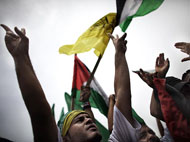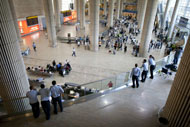
Right now, as the people of Gaza still recover from the devastation that befell them, it is hard to see anything good. It is also still too early, but there are small, hopeful signs that maybe this tragedy has somehow brought us to our senses.
The term reconciliation has, over the past few years, become a hollow word, a catchphrase that old, tired and uninterested politicians use to blame other old, tired and uninterested politicians for not honoring. The people, as a result, have stopped hearing it and have begun to resent the leaders who incessantly repeat it knowing all too well that their words will never be translated into action.
Today, reconciliation between Hamas and Fatah and between Gaza and the West Bank could be closer than it has been in years. Unfortunately, it has taken a war on Gaza, the loss of 160 or more lives and the destruction (yet again) of much of Gaza’s homes and infrastructure, to realize that this is the single most important task before us.
There have been promising indications that both sides – Hamas in Gaza and the PA in the West Bank – are taking practical steps towards this reunification. Hamas has basically given its seal of approval to President Mahmoud Abbas’ UN bid, something which was out of the question before the invasion. In a meeting with a Hamas delegation in Ramallah, Abbas said the Islamic movement would be included from now on in leadership meetings including PLO executive committee meetings, perhaps as a way to rebuild faith and confidence between the two sides. And a meeting of Hamas and Fatah leaders is supposed to take place in Cairo after Abbas returns from New York to discuss ways of jumpstarting unity talks again. Additionally, the President has called for a meeting of political leaders and independent figures from one side of the Palestinian political spectrum to the other in order to map out the future of the “national project” lost all these years in the melee of internal bickering.
Furthermore, in an interview with CNN, Hamas chief Khaled Meshaal said clearly that Hamas would accept a state along the 1967 borders and would resort to peaceful means “without weapons and bloodshed” if the Palestinians’ rights were restored and the occupation was ended.
Of course, talk is cheap. We have heard it all before – the importance of one Palestinian voice, unity among the ranks, how our disunity makes us weaker in the face of the Israeli occupation, etc. But these words have always crumbled into a pile of deceptions, lies and accusations, topped with more disappointment for the people.
This time around could be different, or at least that is the hope. Fatah leader Nabil Shaath stood side by side with his Hamas compatriots in Gaza, praising the resistance of the people and clasping hands with them in unity. There is something about fighting side by side against a common enemy that unites. In Gaza, Israel did not differentiate between a Hamas or Fatah fighter, between a child whose father was a Qassam Brigades commander or a teacher, or a taxi driver or a farmer. It did not care whether a green Hamas or yellow Fatah flag hung in the sitting room of the homes it blew to pieces or if the mothers who buried their babies were loyal to President Abbas or to Ismail Haniyeh, or like many, to neither. This lack of differentiation and the indiscriminate brutality with which Israel treats us all has grotesquely united us. Over the bodies of our children and the ruins of our homes and the pain of our wounded, we know that even if our leaders do not always consider us as one, Israel certainly does. And that, no doubt was a cruel awakening for our leaders, blinded by their hunger for authority.
The momentum for reconciliation is there. The question is whether it will come to fruition once President Abbas returns from the UN, hopefully with a new status upgrade for the State of Palestine.
If for no other reason, we owe it to our dead to honor this pact to stay united. Death is a horrible thing when it comes so unnaturally, unexpectedly and so cruelly. The people of Gaza and all Palestinians who lost their lives in the name of Palestine are waiting. They are waiting for the salvation that will give meaning to their deaths, to know that they have not died in vain. Giving them back a united Palestinian front is the first step to honoring their sacrifice. And regaining Palestine is, of course, the ultimate prize to be won.
Joharah Baker is a Writer for the Media and Information Department at the Palestinian Initiative for the Promotion of Global Dialogue and Democracy (MIFTAH). She can be contacted at [email protected].









